The Mainstream Phoenix Rises: Samsung's 970 EVO (500GB & 1TB) SSDs Reviewed
by Billy Tallis on April 24, 2018 10:00 AM ESTAnandTech Storage Bench - Heavy
Our Heavy storage benchmark is proportionally more write-heavy than The Destroyer, but much shorter overall. The total writes in the Heavy test aren't enough to fill the drive, so performance never drops down to steady state. This test is far more representative of a power user's day to day usage, and is heavily influenced by the drive's peak performance. The Heavy workload test details can be found here. This test is run twice, once on a freshly erased drive and once after filling the drive with sequential writes.
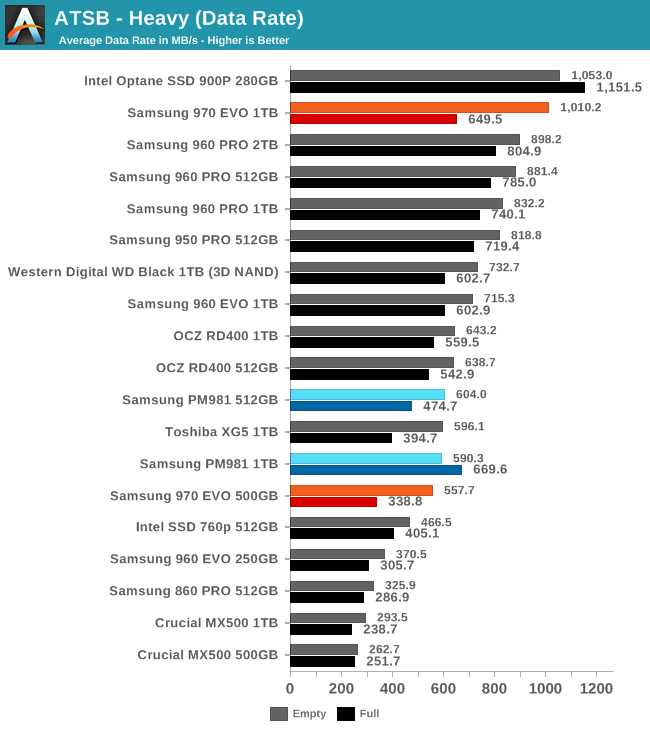
Our initial runs of the Heavy test on the Samsung 970 EVO produced results similar to the Samsung PM981, with the 1TB model showing worse performance on an empty drive than a full drive. This seems to be related to the secure erase process used to wipe the drive before the test. Like many drives, the 970 EVO seems to lie about when it has actually finished cleaning up. Adding an extra 10 minutes of idle time before launching the Heavy test produced the results seen here, and in the future all drives will be tested with longer pauses after erasing (all other drives were given at least two minutes of idle time after each erase).
With the odd behavior eliminated, the Samsung 970 EVO comes close to setting a new record on the Heavy test. The empty drive performance of the 1TB model is up in Optane territory, though the full drive average data rate is not much higher than other TLC-based drives. The 500GB model is far slower, and its full-drive performance doesn't even keep pace with the Intel SSD 760p.
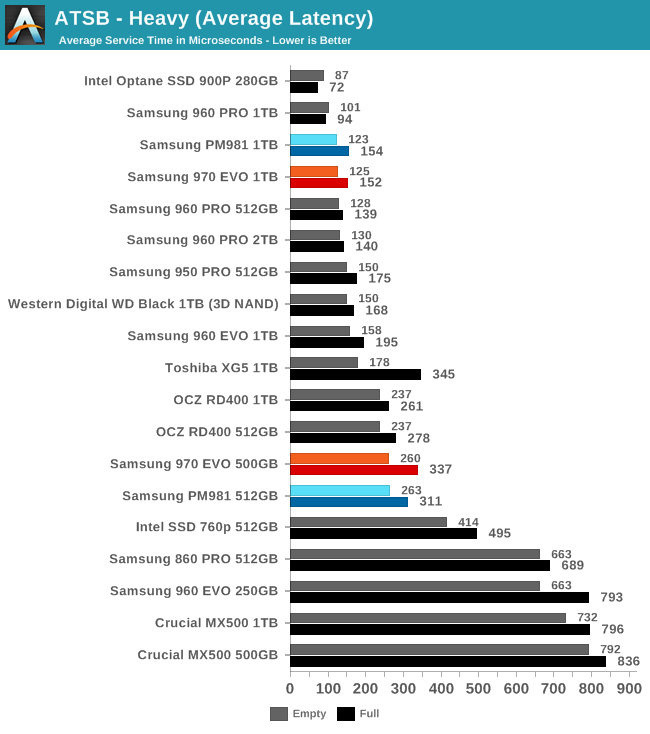
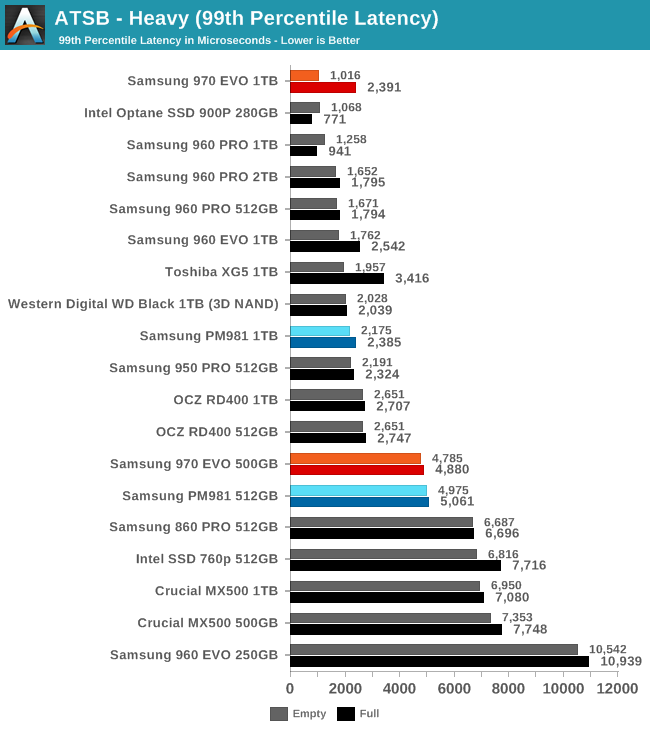
The average and 99th percentile latency scores from the Samsung 970 EVO are about normal and in line with its closest competitors, except for the particularly good empty-drive score from the 1TB 970 EVO.
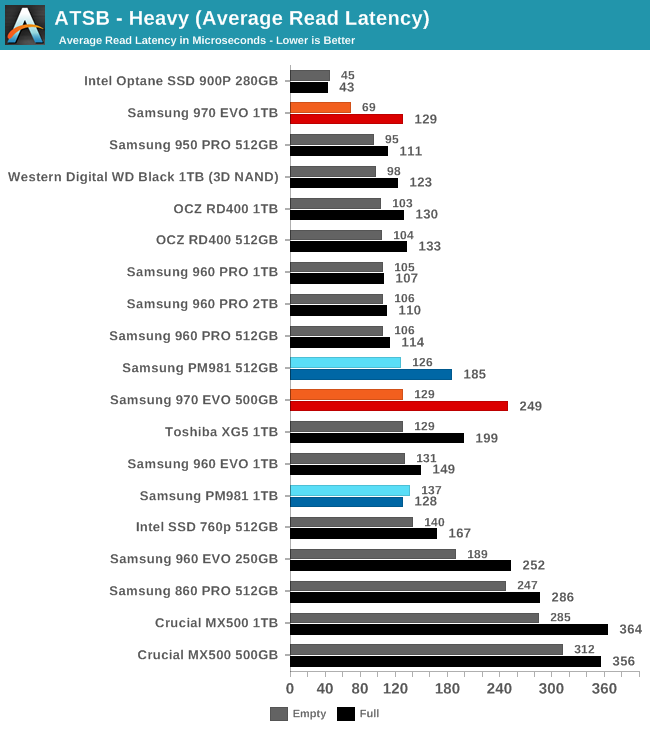
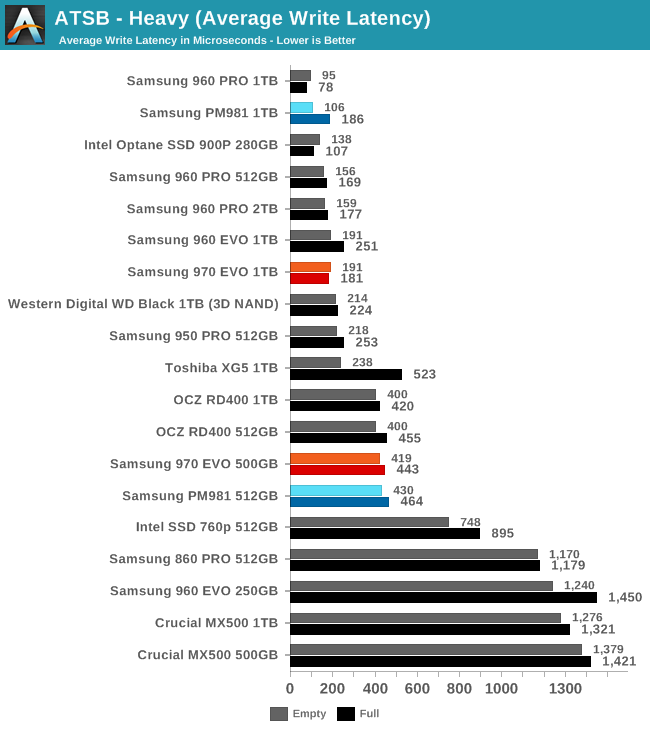
The average write latency of the 970 EVO is fairly typical for a high-end NVMe SSD, but the average read latency of the 1TB 970 EVO in the best case is surprisingly quick. Both capacities show a larger than normal gap between empty and full drive performance, even after accounting for the fact that they are using TLC to compete against the best MLC drives.
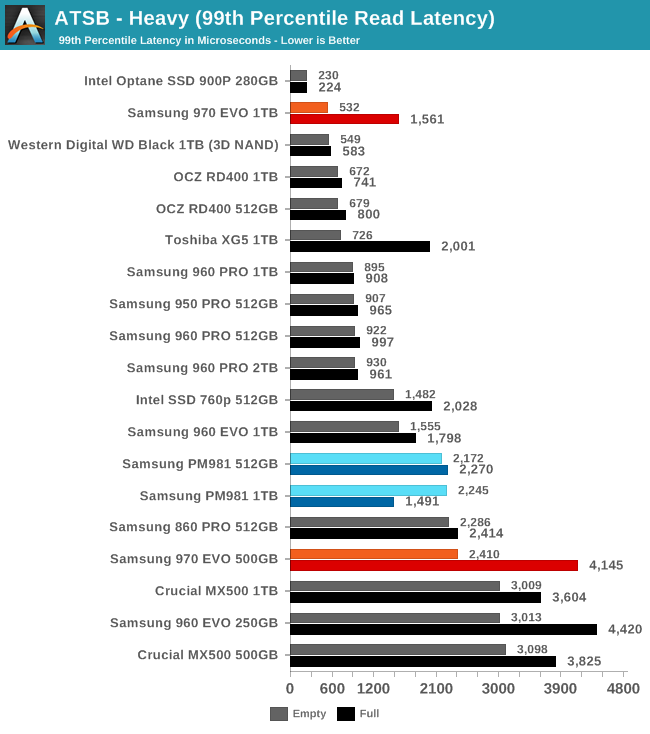
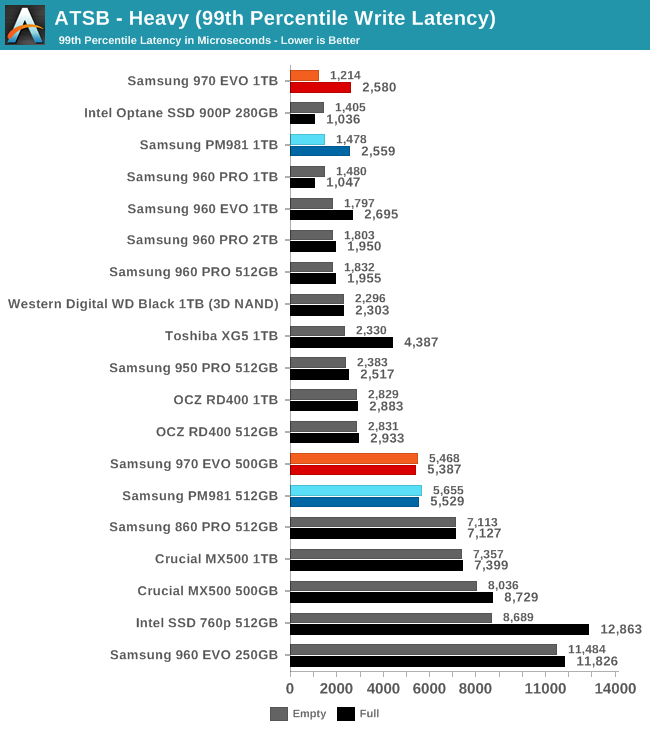
The 99th percentile read latency scores from both tested capacities of the 970 EVO show a big difference between full drive and empty drive performance. The 500GB drive's read QoS doesn't seem up to par, but the 1TB model's scores would look pretty good if the WD Black hadn't recently shown up with an MLC-like minimal performance loss when full. The 99th percentile write latency scores of the 970 EVO are good but not substantially better than the competition, and the 500GB model is clearly worse at keeping latency under control than the 1TB model or MLC drives of similar capacity.
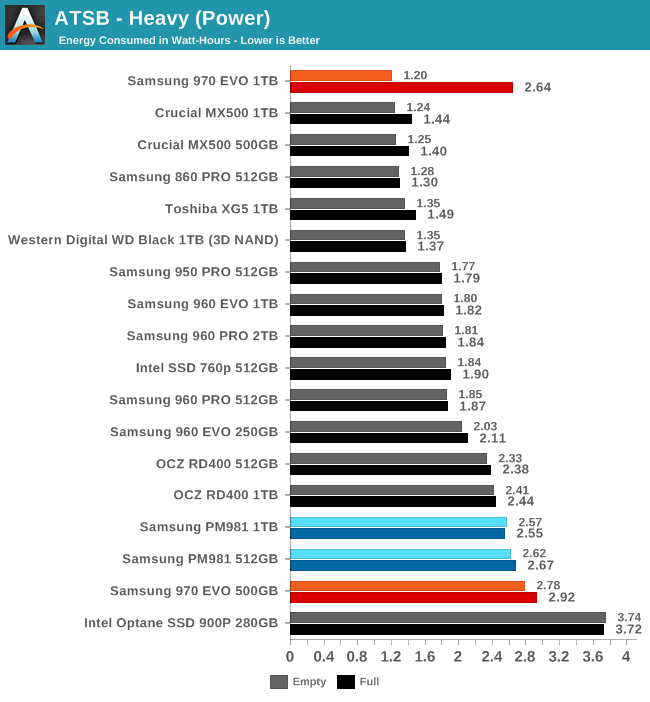
The 500GB 970 EVO continues the trend of relatively poor power efficiency from the Samsung Phoenix controller, but the 1TB model in its best case of running the test on an empty drive is fast enough that its overall energy usage is comparable to good SATA drives.










68 Comments
View All Comments
qlum - Tuesday, October 16, 2018 - link
Just as a reminder how the argument against the ssd can change overtime:Right now the prices at least here in the netherlands are as follows:
Crucial MX500 (SATA) €160
HP EX920 (NVMe PCIe x4) €287
Intel 760p (NVMe PCIe x4 ) €289
WD Black (NVMe PCIe x4) €312
Samsung 970 EVO (NVMe PCIe x4) €269
Samsung 960 PRO €374
Suddenly the 970 evo is the cheapest of the bunch this makes its value a lot better
Of course there are still cheaper nvme ssds such as the intel 660p but at the tb mark its one of the cheapest nvme ssd's
modeonoff - Tuesday, April 24, 2018 - link
Isn't nvme m.2 SSD performance affected by Meltdown/Spectre patches?Billy Tallis - Tuesday, April 24, 2018 - link
Yes, because storage benchmarks make system calls more frequently than almost anything else. Once the updates have been applied to the testbed, I'll be re-testing everything for future reviews. This will take a while, so I've waited until I have several reviews worth of testing completed that can fill the gap before I have new results for a new drive and the older drives it needs to be compared against.My preliminary tests of the impact of the patches show that while the scores themselves are affected, the rankings of drives aren't, so the current measurements are still useful for judging which drives are best.
Reppiks - Tuesday, April 24, 2018 - link
Could be nice to see AMD vs Intel post patches as it shouldn't affect AMD as much?Infy2 - Tuesday, April 24, 2018 - link
Nvme and Sata controllers are made by AsMedia on AMD's AM4 mother boards. Sadly they are somewhat slower than Intel's controllers. Even after Spectre and Meltdown patches Intel is still king of storage performance.Tamz_msc - Tuesday, April 24, 2018 - link
Ryzen CPUs have a dedicated PCI-E x4 link for nvme drives which bypasses the chipset.bernstein - Tuesday, April 24, 2018 - link
nvme is just PCIe x4 + software... that's why a passive pcie x4 to m.2 works. and why a nvme m.2 ssd should work with reduced speed over PCIe x1 or PCIe x2. the same goes for PCIe 2.0 links... combine these and you get a working passive mPCIe to M.2 adapter.willis936 - Tuesday, April 24, 2018 - link
NVMe controllers are made by Intel, AMD, and Microsoft (and whatever analog set of companies for mobile) because it's just a software stack that runs on CPUs.Kwarkon - Wednesday, April 25, 2018 - link
Close but not exactly. You mean drivers.HStewart - Tuesday, April 24, 2018 - link
I personally think people are making a bigger deal of this Methdown/Spectre stuff than it worth it.Yes performance is one area - but there are other reasons why people purchase a product.
Especially in heavy graphics or in this case storage usage - these patches should not have no minimal effect.
To the average customer - the effect is not notice - how much will they notice a 5% or leas slow down in cpu speed. But change a hard drive to one of these SSD's would be a significant improvement